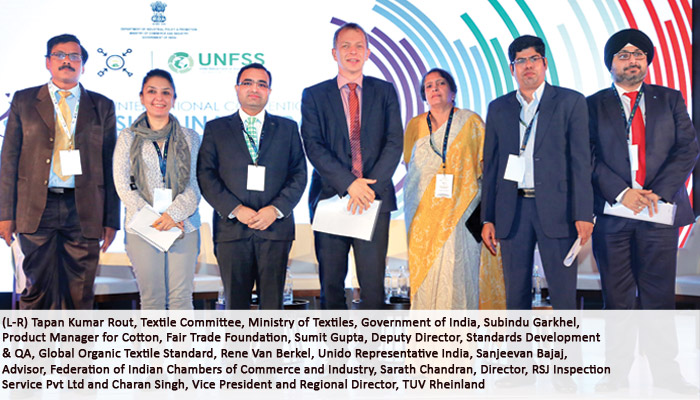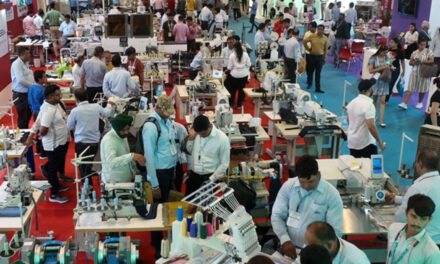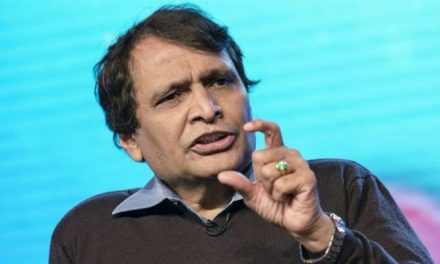Sustainability standards take steps towards ensuring long-term sustainability of value chains. They also prepare the national market by increasing consumer awareness. Standards demand for product & environmental safety, livelihood improvement of workers, together with improving competitiveness of industries, production practices of the fast-growing smallholder segment, and mainstreaming smallholders into the sustainability fold.
The ‘International Convention on Sustainable Trade and Standards’ (ICSTS) was the first of its kind multi-stakeholder Convention. The event was convened by the Quality Council of India (QCI) in collaboration with the United Nations Forum on Sustainability Standards (UNFSS). It was held on September 17-18, 2018 in New Delhi, India. This high-level Convention looked into leveraging trade, standards, and global value chains as engines of sustainable development.
The participating bodies at the event included UNFSS, UNCTAD, UNIDO, FAO, ITC, UNE, WTO, ILO, government institutions, standards bodies and agencies from Brazil, South Africa, Indonesia, China, Germany, Canada, UK, Sweden, Switzerland, among others. The primary targets of this convention included corporations, sustainability standards organisations, MSMEs, smallholders, governments, procurement experts, and youth from relevant backgrounds.
UNFSS featured the international launch of the 3rd UNFSS Flagship Report at this Convention. The report was introduced by Santiago Fernandez De Cordoba, the Coordinator of the UNFSS. The UNFSS publishes a biennial flagship report on diverse topics to do with Voluntary Sustainability Standards (VSS), their mission and activities, for their stakeholders from the public and private sectors. The first volume of the Flagship Report was launched in 2013, and the second one in 2016. The 3rd UNFSS Flagship is set to impart an agenda surrounding VSS and its relation to trade issues, in particular the impact of VSS on market access.
What are sustainability standards?
Sustainability Standards are special rules that guarantee that the products you buy don’t hurt the environment and the people that make them. Standards are considered a market-based tool to transform production, global supply chains and consumption patterns into more sustainable ones.
In India, Indian small producers get barred from entering GVCs due to the restrictive market access impact of private standards. In most developing economy contexts, smallholders are left outside the realm of decision making when standards are formulated. Through this convention ICSTS intends to course-correct this problem and draw up an inclusive roadmap for cooperation in trade and standards. India has been in the forefront of supporting environment and sustainability policies which are in line with its international commitment and other social standards. However, India has consistently maintained, including at WTO that sustainable development agenda may not be linked with trade, as environment, labour and other social standards are not a direct function of international trade. There is a need to address the issues of, among others, duplication, accountability, traceability, legitimacy and costs in the domain of private standards. India is willing to lead a producer-centric agenda for regional and global cooperation in trade and capacity development for responding to the challenges in the domain of tackling sustainability standards issues in trade.
Commenting on the event, Ajit Chavan, Secretary, Textile Committee, Ministry of Textiles, Government of India said, “The issues like Trade Global Value Chain and Standards have potential to influence the overall growth prospective of the Indian textile and clothing industries. Standardization will help in rationalizing the quality aspects of the different key parameters of the products giving rise to better competitive advantage to Indian products in the International market the Textiles Committee being in the forefront in the areas of quality inspection testing and conformity assessment quality assurance can contribute in these emerging areas in strengthening the textile value chain.”
Santiago Fernandez De Cordoba, Coordinator, UNFSS, concurrently added, “The ICSTS explores opportunities in enhancing developing countries’ capacity to trade to the global market. Sustainability standards are becoming a market reality and coping with them can create business opportunities.
Agreeing to this Anupam Kaul, Principal and Head QMS, CII said, “The Indian National Strategy for Standardization recognizes the growing influence of Private sustainability standards on trade, and recommends a holistic approach for India to meet the global expectations.”
Dagmar Walter, Director, and International Labour Organization also added “It is important for suppliers to have one consistent set of expectations from buyers, which protects the rights of workers while also supporting suppliers to compete in global markets.”
GOTS supports the convention
GOTS was the Supporting Partner to this Convention. The convention was dedicated solely to the practical questions of leveraging trade, standards, and global value chains as engines of sustainable development. It encompassed Sustainable trade concept which acquires a broader conception of environmental, economic and social sustainability.
Sumit Gupta, GOTS Deputy Director, Standards Development & Quality Assurance was invited as a panelist in the textile session titled ‘Strengthening Multi- Stakeholder Sectorial Initiatives and Responsible Sourcing Decisions in Textiles Value Chains.” The session was moderated by Rene Van Berkel from UNIDO.
As the world’s leading standard for processing of organic fibres, GOTS is actively working with national and international brands towards bringing in more transparency and accountability in textile supply chains. The criteria include traceability, waste treatment, environment, working conditions and other aspects of social compliance. This includes prohibition of child labour, excessive overtime and fair remuneration and so on. At the heart of GOTS criteria, there is this requirement to use minimum 70 per cent organic fibres in the main material. It could be organic cotton, organic wool, organic silk or other certified organic fibres.
Gupta explained that GOTS is a multi-stakeholder standard and has a transparent process for standard setting and revision. GOTS actively engages with other standards to avoid double working. He provided the example of social compliance, where GOTS has listed four social standards including SA 8000 in its Implementation Manual.
Gupta also elucidated how third-party standards, such as GOTS, can help to improve the supply chain interactions; all certified operations are listed in a public database for sourcing and proof. He also referred to the recently released GOTS Factsheet on how certification to GOTS helps to ensure compliance to each of the 17 Sustainable Developmental Goals (SDGs). “GOTS is a Consumer Facing label. GOTS certified businesses are able to make sustainability claims that are visible to the end consumer. Consumers can then make informed decisions and can also verify those claims on GOTS website,” concluded Gupta.














